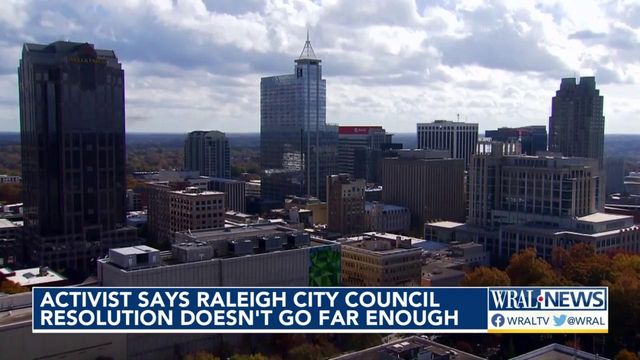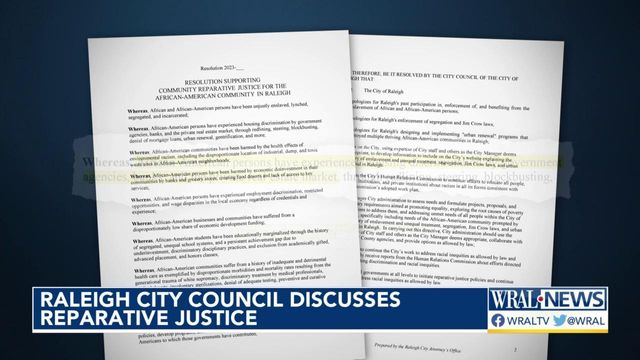Raleigh council passes resolution to apologize for city's racist past
The Raleigh City Council is taking a step toward reparative justice for the city's African-American community.
On Wednesday, the city council voted unanimously to approve a resolution that acknowledges the lingering effects of slavery and Jim Crow on Black families. Raleigh joins other cities in North Carolina, like Durham and Asheville, which have passed reparative justice resolutions in the past few years.
Proponents of reparations say it’s needed to narrow the wealth and opportunity gap between the African-American and white community that exist largely due to slavery.
The Raleigh City Council's resolution states African American residents have been unjustly enslaved, lynched, segregated and incarcerated. As a result of this, their descendants have been subjected to:
- Housing discrimination by banks, governments and real estate markets
- Harm by environmental racism
- Educational marginalization
- Targeting by the criminal justice system
The resolution also said that governments have a "moral and practical obligation to adopt policies, develop programs and allocate funding.”
The city's resolution apologizes for participating, enforcing and benefiting from slavery, segregation and Jim Crow. It also apologizes for urban renewal projects that destroyed local African American communities.
At-Large Council Member Jonathan Melton said he’d like to see the city council have the authorization to allocate funding toward programs that could use a boost in the next fiscal year budget.
District A Council Member Mary Black echoed Melton’s sentiments.
“It’s been a process to get it to this point,” Black said. “So, just the understanding that this isn’t something that’s going to be done immediately before the end of this year.”
The resolution falls short of forming a Racial Equity and Reparative Justice Commission as was in the original version of the resolution. Interim City Attorney Dottie Kibler advised the council lacked the authority to establish such a commission.
Kibler said she looked at similar resolutions passed by other municipalities. She discussed how the city has already taken actions to address underlying issues.
“The efforts that you’ve done to deal with poverty and to address homelessness and to address anti-discrimination efforts, so those were the things that I had in mind with that statement,” Kibler said.
“We had conversations for a couple weeks talking about the right choice of words to make sure that we’re not limiting or committing to something that, procedurally, we don’t have policy guidance and direction to do, or legislatively, we don’t have the authority to necessarily do,” said Raleigh City Manager Marchell Adams-David.
Community activist Kara Sanders said the Raleigh City Council fell short in their apology for slavery.
"I know their hearts are in the right place, but it is not enough," Sanders said.
The resolution does call for governments to start reparative justice projects and address racial inequities. However, the resolution stops short of offering any concrete plans of action.
"Did you feel bad about those actions, and if you did, then why is it still happening?" Sanders said.
Sanders said the apology felt like lip service.
"Why are historically black neighborhoods being completely decimated, destroyed [and] people of color being displaced?" Sanders said. "Why is it that there is a high proportion of people of color who are homeless?"
On Wednesday, Duke University public policy professor William Darity Jr. said the resolution shouldn't be called "reparations" because only the federal government can really do that.
"I'm absolutely convinced that if one is going to pursue a true reparations project it has to be conducted at the federal level," Darity said.
Darity said the federal government has the resources to conduct a "comprehensive reparations plan while state and local municipalities do not.
"The combined budgets for all states and municipal governments in the United States comes to $5 trillion, and the amount of resources that would be required to conduct a full reparations plan, which from my perspective would eliminate the Black-white wealth disparity in the United States, would require an expenditure of at least $14 trillion," Darity said.
Darity said teaching an accurate history of the country's past is vital.
On April 4, the city council asked Kibler for legal guidance on the resolution.
The city council has not set out a timeline or details on how it will accomplish the plans outlined in the resolution.











